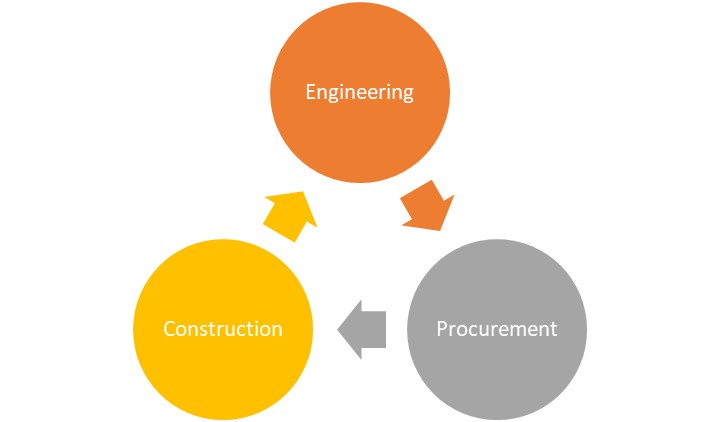EPC Designing Firm is a sector within the development industry where a specific private corporation engages in a contract with a singular EPC Contractor (a company responsible for executing an EPC project), who assumes full responsibility for designing, procuring, constructing, managing, and delivering the project to the client.
Table of Content
- EPC Full Form: Phases of EPC Projects
- EPC Full Form: Benefits and Challenges of EPC Contracts
- EPC Full Form: EPC Project Management Best Practices
- EPC Full Form: Top EPC companies in India
- EPC Full Form: EPC Principles
- EPC Full Form: Few points about EPC
- EPC Full Form: Conclusion
- EPC Full Form: FAQs About EPC

Understanding the Phases of EPC Projects
EPC projects can be broken down into distinct phases:
- Engineering Phase: This is where detailed planning takes place. Engineers design the project, create blueprints, and develop specifications.
- Procurement Phase: In this stage, materials, equipment, and services needed for the project are sourced and acquired.
- Construction Phase: The physical building of the project happens here. Contractors and workers implement the plans and assemble the infrastructure.
- Testing and Commissioning Phase: After construction, thorough testing of systems and components is done to ensure they work as intended. This phase leads to the project’s operational readiness.
- Handover Phase: The completed project is handed over to the client after successful testing. This includes transferring all relevant documents and operational information.
- Completion Phase: In this final stage, any remaining tasks are finalized, and the project is formally closed.
Benefits and Challenges of EPC Contracts
- Single Point of Responsibility: EPC contracts provide a single entity responsible for the entire project, streamlining communication and accountability.
- Time and Cost Certainty: EPC contracts often have fixed timelines and costs, reducing the risk of delays and budget overruns.
- Efficient Project Management: The integrated approach of EPC contracts can lead to better coordination and faster project completion.
- Risk Allocation: Risks are typically allocated to the EPC contractor, minimizing the client’s exposure to unforeseen issues.
- Quality Control: EPC contractors are incentivized to ensure high-quality work as they are responsible for the entire project’s success.
- Expertise and Experience: EPC contractors bring their specialized skills and experience to manage complex projects effectively.
EPC Project Management Best Practices
- Effective EPC project management entails a set of best practices that collectively ensure the seamless execution of complex infrastructure projects. At the outset, crystal-clear project scope and well-defined objectives must be established to avoid ambiguity.
- Communication stands as a linchpin, necessitating open and transparent channels among all stakeholders to maintain alignment and resolve challenges promptly. An early identification of potential risks, followed by the formulation of strategies to mitigate these risks, is indispensable.
- Prudent vendor and supplier management contribute to the project’s success, as does a structured change management process that handles alterations to scope or design in a controlled manner. A robust document control system keeps project-related information organized and accessible.
Top EPC companies in India
- Larsen & Toubro
- Nagarjuna Construction Company
- Punj Lloyd
- IVRCL
- Tata Projects
- Hindustan Construction Company
- Gammon India
- JP Associates
EPC Principles
Standards for deciding the agreement’s degree.
The agreement should be formulated with the business objectives in mind. The agreement’s purpose should be clear and unambiguous. The agreement’s scope should be meticulously prepared, detailing all aspects and timelines for key activities to be carried out by the involved parties. If multiple contractors are involved in the project, the scope matrix should outline the division of tasks, specifying activities in terms of quantities with no overlaps or gaps. The starting points and scope limitations must consistently be referenced. The agreement’s scope should not be overly intricate or technical.
Few points about EPC
- Holistic Management: EPC entails comprehensive management of projects from inception to delivery, ensuring a cohesive approach.
- Turnkey Solutions: EPC contracts offer all-inclusive solutions where contractors handle every project aspect, eliminating client coordination efforts.
- Risk Distribution: EPC shifts project risks to contractors, motivating them to address challenges effectively.
- Defined Parameters: EPC establishes clear project parameters, including costs, schedules, and performance expectations.
- Expertise Fusion: EPC integrates diverse expertise, promoting synergy among engineering, procurement, and construction.
- Quality Accountability: EPC mandates contractors to uphold project quality, adhering to specified standards.
- Complexity Management: EPC suits intricate projects, minimizing complexities through a unified project entity.
- Contract Precision: EPC agreements require precise drafting to prevent misunderstandings and define obligations.
Conclusion
In conclusion, the Engineering, Procurement, and Construction (EPC) approach stands as a cornerstone of modern project management for large-scale infrastructure and industrial projects. EPC contracts offer a holistic solution, encapsulating the entire project lifecycle from initial design to final handover. This integrated approach brings together engineering expertise, efficient procurement practices, and meticulous construction management under one umbrella.
FAQs About EPC
EPC stands for Engineering, Procurement, and Construction. It‘s a project delivery method commonly used in various industries where a single contractor is responsible for the entire project lifecycle, from design and procurement to construction and commissioning.
EPC contracts are widely used in industries such as energy (power plants, oil and gas), infrastructure (roads, bridges), manufacturing (industrial facilities), and more.
EPC contracts offer streamlined project management, reduced coordination efforts, single-point responsibility, and faster project completion due to the integration of engineering, procurement, and construction phases.
EPC projects can face challenges such as scope changes, budget overruns, delays, regulatory compliance issues, and managing complex supply chains.
Related posts:
- AMC Full Form: Benefits, Components, Needs, Advantage
- ORS Full Form: Dehydration, Myths, Flavors, Varieties & Facts
- PCC Full Form: Importance, Types, Application Process
- PAN Full Form: Legal Provisions, Regulations,
- BRB Full Form: Productive, Routine, Distractions
- MCD Full From: Introduction, Responsibility, Challenges
- CT Scan Full Form: Scans, price, Advantages
- USA Full Form: History, Economics,Technology, culture




















